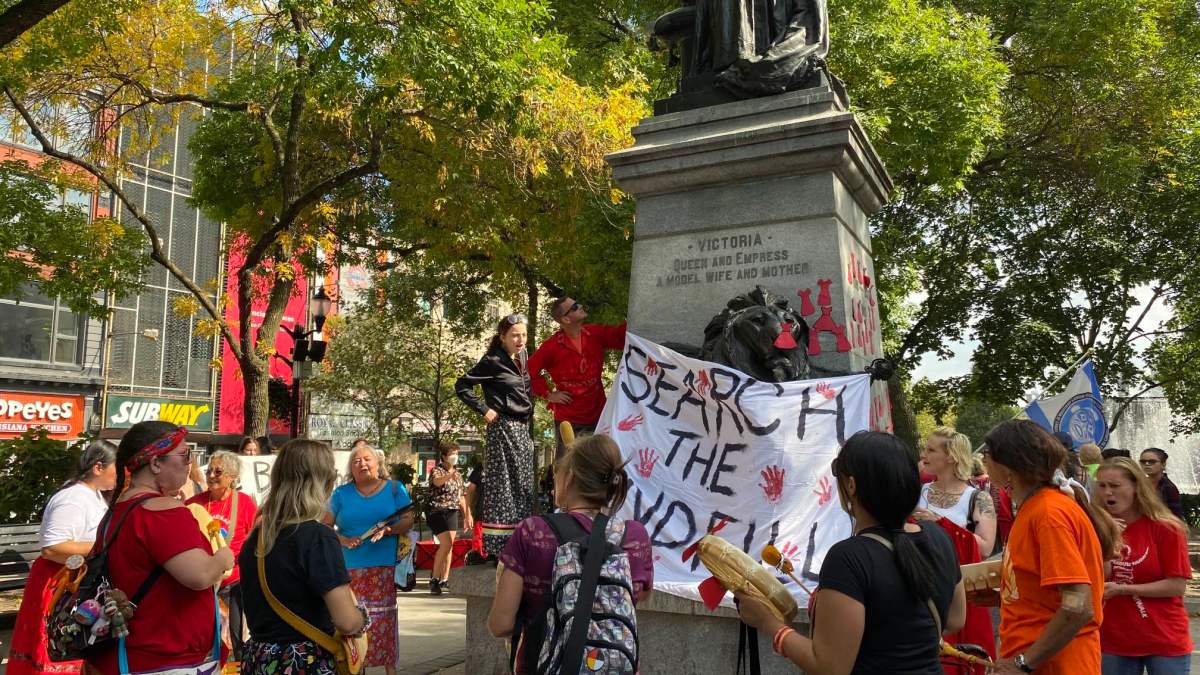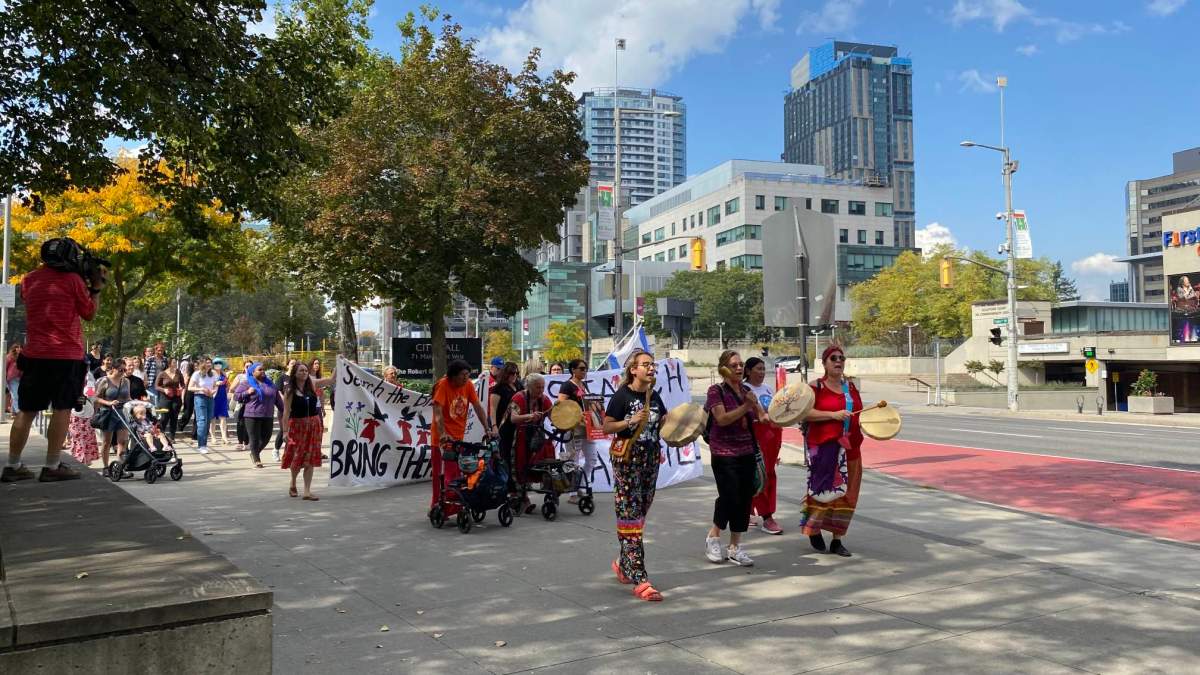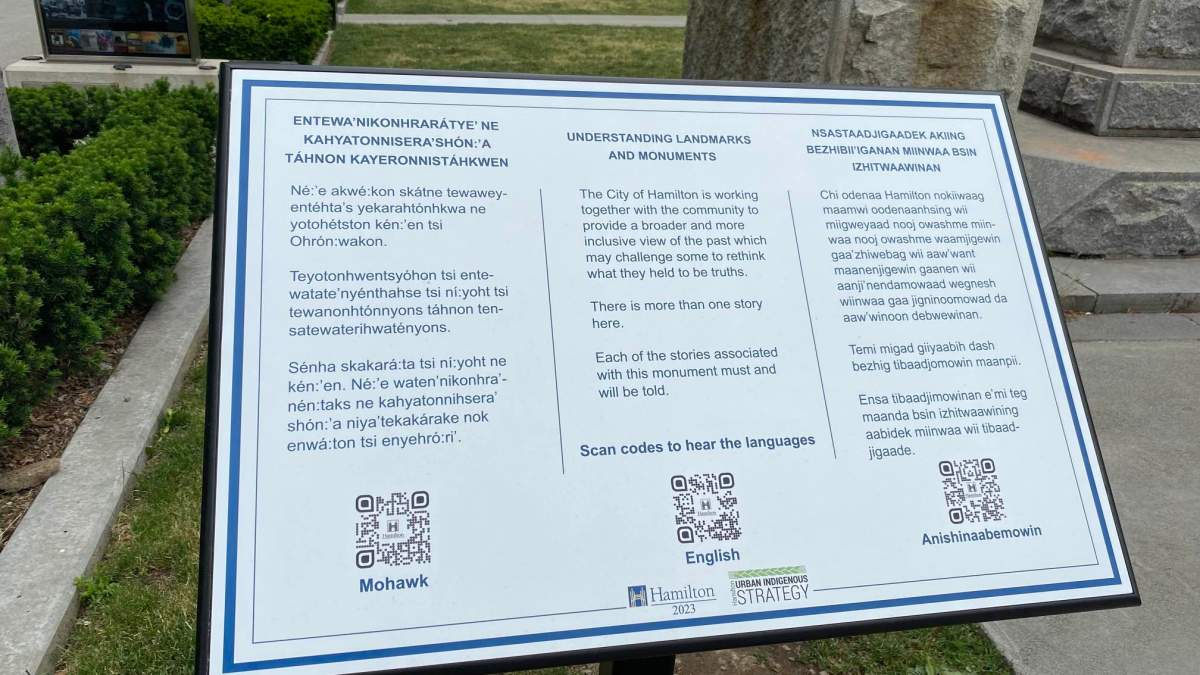A group of advocates made a stop in downtown Hamilton Ont. Wednesday to mark the National Day of Action for Missing and Murdered Indigenous Women, Girls, and Two-Spirit People (MMIWG2S).

The Sisters In Spirit flag is flying at city hall, where community members spoke to mark the more than 4,000 women, girls and two-spirit people who have gone missing or been murdered as highlighted in a national inquiry.
Supporters marched from city hall to the Queen Victoria statue in Gore Park, and hung red dresses in honour of Indigenous people who have been killed or lost over decades.
The symbols are an extension of Red Dress Day, a period of mourning every May, in remembrance and action on the MMIWG2S crisis that has plagued Canada for generations.
Red Dress Day began in 2010, inspired by Jaime Black’s REDress Project — an art installation and visual reminder of the “staggering” number of Indigenous women who are victims of violence.
Lyndon George, Indigenous justice co-ordinator with the Hamilton Community Legal Clinic, says the statue serves as a painful reminder about the harm caused to First Nations people in the name of colonialism.

Get daily National news
Despite questions on why the figure “of great harm” continues to reside in the core, he appreciated the city’s acknowledgment of a “rethink” of monuments across the city.
“I really like what the city has done to (the) urban Indigenous strategy … putting in the narratives, helping people better understand and the harm that gets done,” Goerge said.
“But it still doesn’t take away the legacy of trauma that happens every time we see these statues.”
One of the calls to action is for a landfill in Manitoba to be searched for the remains of two Indigenous women who were killed last year.
The remains of the pair, Morgan Harris and Marcedes Myran, are believed to be in the Prairie Green landfill, just north of Winnipeg.
Last month, Premier Heather Stefanson issued a statement saying her government would not support or fund the search of the landfill, citing safety risks.
The decision prompted protests and public outcry, as well as a blockade at the Brady Road landfill, south of Winnipeg, that lasted nearly two weeks.
- Arrested Western University students were making bombs, firearms, police allege
- Man wanted for alleged abduction in Manitoba arrested, woman found safe
- Gavin McKenna, top NHL prospect, gets felony assault charge withdrawn
- British man who was living in Vancouver convicted in U.S. dark web drug trafficking
In 2019, a national inquiry into the MMIWG2S crisis found more than six in 10 Indigenous women, girls and gender-diverse people have experienced physical or sexual violence. They are also 12 times more likely to be missing or murdered than non-Indigenous women.
A 2014 RCMP report suggested some 1,200 Indigenous woman and girls have gone missing or been killed in Canada, but underreporting and a lack of data means that number is likely inaccurate. Other estimates have since pegged the true number at more than 4,000.
— with files from Elizabeth McSheffrey and Marney Blunt
Battered Women’s Support Services is available to assist those in need with emotional support, safety planning, and legal advocacy at 604-687-1867 or toll free at 1-855-687-1868. Those who cannot speak safely can text 604-652-1867.
The Hope for Wellness Help Line offers culturally competent counselling and crisis intervention to all Indigenous peoples experiencing trauma, distress, strong emotions and painful memories. The line can be reached anytime toll-free at 1-855-242-3310.








Comments